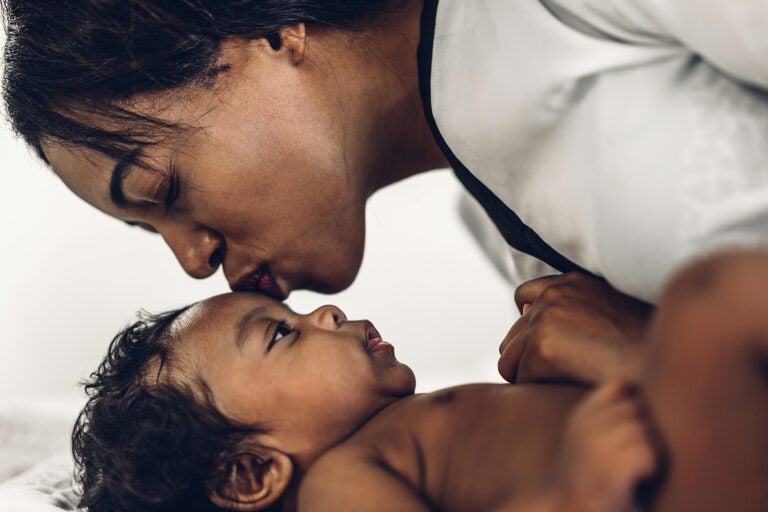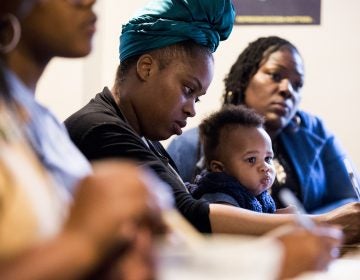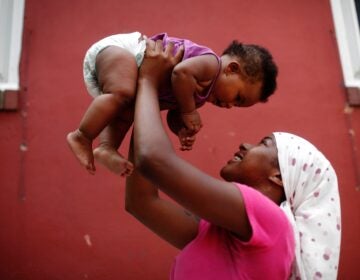A look at how it feels to be a new mother in these pandemic times
A research team from CHOP and Penn is studying survey responses from 913 women about their experiences in pregnancy, delivery, and postpartum.

(Achi_Studio/BigStock)
Ask us about COVID-19: What questions do you have about the coronavirus and vaccines?
For the past pandemic year, everyone has been worried about somebody, it seems.
Dr. Wanjiku Njoroge has been worried about new mothers in particular, and the potential long-term consequences of living against the backdrop of COVID-19.
“Our immediate concern is not just the mom’s mental health,” said Njoroge, “but how that mom’s health is impacting their baby … and so we’re trying to understand if there are resources that families have access to or that we can put into place that will help.”
Along with Sara Kornfield, an assistant professor of psychiatry at the Hospital of the University of Pennsylvania, Njoroge belongs to IGNITE, a multidisciplinary research group that represents a collaboration between the Lifespan Brain Institute (LiBi), which studies how the brain and behavior develop and change over time and in response to different illnesses, and Penn’s Maternal and Child Health Research Center. Njoroge is an infant/preschool psychiatrist at Children’s Hospital of Philadelphia, and associate chair for diversity, equity, and inclusion at its Department of Adolescent Psychiatry and Behavioral Sciences.
The group focuses on the peripartum period, just before and after birth. Its research looked at pregnant women who responded to surveys in April and May 2020 and followed their experiences in pregnancy, delivery, and postpartum. Data is still being collected, and the researchers’ most recent findings have not yet been published, but broadly the group found that the pandemic increased rates of peripartum mood disorders such as depression while exacerbating preexisting disparities.

The IGNITE team surveyed 913 pregnant women. Data from surveys gathered during pregnancy was published in September.
“Black women specifically had higher rates of depression and anxiety, and they also had different COVID-19-specific worries when compared to non-Latinx, white women,” said Njoroge. Black mothers were more likely to worry about their job security, the lasting impacts of COVID-19, pre- and postnatal care, and physically giving birth. They also reported a greater likelihood of having their employment negatively affected, and more concerns about a lasting economic burden.
Economics have certainly been at play during the pandemic. Although some worries are universal, others can be sharply shaped by things such as class and race. Colette Green, senior director of programs at the Maternity Care Coalition in Philadelphia, said most of the organization’s clients are covered by public insurance, Medicare or Medicaid.
”[The] population that we work with … they don’t have the luxury of working from home,” she said. That can mean a whole new type of stress and anxiety around exposing family members to COVID.
And although in some circumstances things might be easier on families who work from home, the stresses around child care, and trying to judge what is safe, can be incredibly difficult. “I see a lot of new moms struggling with this idea,” Kornfield said, “there’s a cost-benefit analysis … that’s sort of impossible.”
Difficult times, with a pandemic added
Nancy, who lives in Bucks County and asked that WHYY not use her last name, had to work through her own cost-benefit analysis. In the end, she chose not to return to work after the birth of her son.
“Making this decision to be a stay-at-home mom was a big decision for me personally,” she said, and it’s something she’s still grappling with.
Nancy’s son was born in November 2019, and she struggled with postpartum anxiety and complications from a C-section. In spring 2020, she was only just coming to terms with what the pandemic would mean for her and her then-4-month-old. She had initially been happy for the forced time at home, “it helped smooth out some of his newborn difficulties, and so by the time he was 6 months old … my husband and I felt like we had gotten through this newborn stage pretty well,” she said. It was right around the start of the IGNITE study that Nancy realized what the pandemic would mean for her and her son.
Nancy and her husband haven’t seen their families in person or gone out to shops since the coronavirus struck. She was looking forward to her son playing with the neighborhood kids, going to story times, and taking him to see her family in Washington, D.C. None of that is on the table right now.
“I am a much more introspective mother … a much more observant mother than I would have been if I wasn’t home with my child all the time,” she said, “I am definitely a much more lonely mother than I anticipated being.”
Isolation is playing a big role in the lives of new parents during the era of COVID-19.
“I think that in our culture, people are sort of expecting or hoping to have some level of family or friends’ support in the home in the early postpartum time,” said Kornfield. That frequently hasn’t been possible.
Naima Black, director of the community doula and breastfeeding programs at the Maternal Care Coalition, echoed the sentiment, and said, “Moms, particularly, families are feeling really isolated … especially first-time parents who can’t have their own family around … are feeling very overwhelmed …”
Both the Maternity Care Coalition and the University of Pennsylvania’s behavioral health department have seen a greater interest in mental health services and referrals.
Increased rates of postpartum mood and anxiety disorders might mean long-term repercussions, especially for moms.
“We found that women who were more worried about specific pregnancy worries related to COVID … tended to have more postpartum depression after they delivered,” said Kornfield, who was part of the research team.
The pandemic’s impact on new mothers could go on long after it ends. “A thing that we know about postpartum depression is that the biggest risk factor … is prenatal depression,” she said.
Individuals who are depressed before they give birth are more likely to develop postpartum depression, and those who develop postpartum depression once are more likely to experience it after future pregnancies too.
“I think the experience … of COVID-motivated depression could certainly put women at risk for having a potentially similar experience in a subsequent pregnancy,” Kornfield said. But she was optimistic that the end of lockdowns and restrictions could protect against that.
Having studied the impact of the pandemic during pregnancy, the IGNITE team is trying to measure its impact on the postpartum period. Although the data is preliminary, it seems as if racial disparities are persisting.
“Our preliminary results showed that Black women were just more fearful overall, and not just for their own lives, but also for the lives of their babies,” Njoroge said.

The Black women in the survey generally reported higher levels of distress during delivery and again had different worries from their white counterparts. “We also found, in … this postpartum period, that Black women are experiencing more symptoms of depression and of loneliness, relative to non-Latinx white women,” Njoroge said. She noted that the general trend of rising rates of anxiety and postpartum depression fit in with research findings from Brigham and Women’s Hospital in Boston.
Separating the impacts of race from those of class is harder. The Black and white women in the IGNITE study weren’t matched for income, geography, education, or socioeconomic status with the other women in the study. But Njoroge said that even after they removed some of those variables, some of the disparities in outcome persisted, “we still found differences in the Black women, when we’re looking at them specifically towards the non-Latinx white women.”
What about the babies?
There is no single, universal pandemic experience. Nancy, although she has missed out on a lot, has been glad for all the time she’s had with her son.
“It has been such a joy watching this tiny human develop and learn about the world, and focusing on him has helped me set aside many pandemic worries,” she said.
Kornfield wonders whether increased discussion about mental health because of the COVID-19 restrictions has reduced stigma about depression in general.
“I think that in the time of COVID, where everyone is struggling a bit and feeling the effects of isolation and limited, social support resources, that it becomes more acceptable to say … ‘I’m not doing OK,’” she said. “More people are feeling that way too.”
What about the babies being born? What’s happening to them?
“We do know that … taking the pandemic out of it, that women that have these peripartum mood and anxiety disorders … parent differently,” said Njoroge. That can impact breastfeeding rates as well as “the dance” — the coordination between mom and baby that is important for attachment and the baby’s development.
As for long-term repercussions for babies, Njoroge is optimistic.
“I am not concerned only because I do believe that … we have a little bit of time on our hands with their little developing brains, she said. “If they’re able to get what they typically need from their primary caregivers, and if we, as a nation, put together enough resources to ensure their healthy and optimal development, then they should be OK.”
“But,” she added, “a lot of those are a lot of moving pieces.”

Get daily updates from WHYY News!
WHYY is your source for fact-based, in-depth journalism and information. As a nonprofit organization, we rely on financial support from readers like you. Please give today.




![CoronavirusPandemic_1024x512[1]](https://whyy.org/wp-content/uploads/2020/03/CoronavirusPandemic_1024x5121-300x150.jpg)



